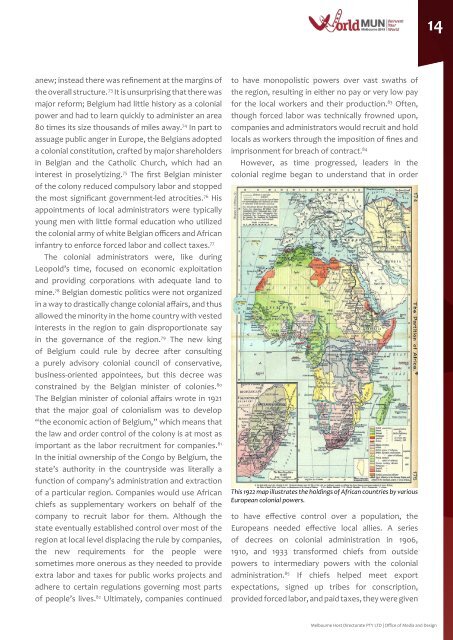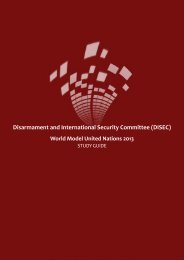Historical Security Council - World Model United Nations
Historical Security Council - World Model United Nations
Historical Security Council - World Model United Nations
You also want an ePaper? Increase the reach of your titles
YUMPU automatically turns print PDFs into web optimized ePapers that Google loves.
anew; instead there was refinement at the margins of<br />
the overall structure. 73 it is unsurprising that there was<br />
major reform; Belgium had little history as a colonial<br />
power and had to learn quickly to administer an area<br />
80 times its size thousands of miles away. 74 in part to<br />
assuage public anger in Europe, the Belgians adopted<br />
a colonial constitution, crafted by major shareholders<br />
in Belgian and the Catholic Church, which had an<br />
interest in proselytizing. 75 The first Belgian minister<br />
of the colony reduced compulsory labor and stopped<br />
the most significant government-led atrocities. 76 His<br />
appointments of local administrators were typically<br />
young men with little formal education who utilized<br />
the colonial army of white Belgian officers and African<br />
infantry to enforce forced labor and collect taxes. 77<br />
The colonial administrators were, like during<br />
Leopold’s time, focused on economic exploitation<br />
and providing corporations with adequate land to<br />
mine. 78 Belgian domestic politics were not organized<br />
in a way to drastically change colonial affairs, and thus<br />
allowed the minority in the home country with vested<br />
interests in the region to gain disproportionate say<br />
in the governance of the region. 79 The new king<br />
of Belgium could rule by decree after consulting<br />
a purely advisory colonial council of conservative,<br />
business-oriented appointees, but this decree was<br />
constrained by the Belgian minister of colonies. 80<br />
The Belgian minister of colonial affairs wrote in 1921<br />
that the major goal of colonialism was to develop<br />
“the economic action of Belgium,” which means that<br />
the law and order control of the colony is at most as<br />
important as the labor recruitment for companies. 81<br />
In the initial ownership of the Congo by Belgium, the<br />
state’s authority in the countryside was literally a<br />
function of company’s administration and extraction<br />
of a particular region. Companies would use African<br />
chiefs as supplementary workers on behalf of the<br />
company to recruit labor for them. Although the<br />
state eventually established control over most of the<br />
region at local level displacing the rule by companies,<br />
the new requirements for the people were<br />
sometimes more onerous as they needed to provide<br />
extra labor and taxes for public works projects and<br />
adhere to certain regulations governing most parts<br />
of people’s lives. 82 ultimately, companies continued<br />
to have monopolistic powers over vast swaths of<br />
the region, resulting in either no pay or very low pay<br />
for the local workers and their production. 83 Often,<br />
though forced labor was technically frowned upon,<br />
companies and administrators would recruit and hold<br />
locals as workers through the imposition of fines and<br />
imprisonment for breach of contract. 84<br />
However, as time progressed, leaders in the<br />
colonial regime began to understand that in order<br />
This 1922 map illustrates the holdings of African countries by various<br />
European colonial powers.<br />
to have effective control over a population, the<br />
Europeans needed effective local allies. A series<br />
of decrees on colonial administration in 1906,<br />
1910, and 1933 transformed chiefs from outside<br />
powers to intermediary powers with the colonial<br />
administration. 85 if chiefs helped meet export<br />
expectations, signed up tribes for conscription,<br />
provided forced labor, and paid taxes, they were given<br />
14<br />
Melbourne Host Directorate PTY LTD | Office of Media and Design
















